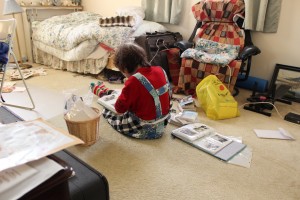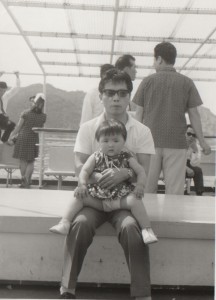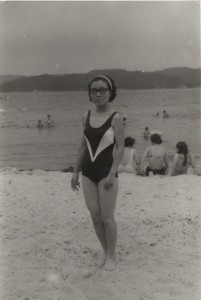This weekend, sneaking out of dorm life, I went back to my home in North Vancouver. I came home to see my grandmother organizing picture albums she had accumulated since her marriage with my grandfather tracing her journey in Japan and Canada.

In times now where my mother and grandpa cannot have a conversation without starting up a fight, the pictures illustrated innumerable moments in the past that I had missed out on. Innocent moments such as where my grandfather would be holding my mother as a toddler, or my (currently very skinny) grandmother as young, fit woman.


The pictures are very treasured pieces of information to me. Valuable archival material that, like the archivists at an archive, I wouldn’t want people destroying or taking out of order. I have always valued these pictures as the pieces of paper allow me to take a look into the years I did not live, they allowed me to understand a family history I am unfamiliar with. The orders in which the pictures were put in are only known to my grandmother who created the files, and has her own story behind each moment she captured. Not only the subjects of the pictures, but the backgrounds of the pictures were as well are interesting to see, as they also give me insight into the landscape of my neighbourhood thirty, forty years back. Interestingly, I also create new memories while exploring these photo albums, as new characters are put into the familiar landscape and in such ways, I create my identity as member of this family.
However, considering in downsizing, the past few years my grandma has been in a phase of clearing out as much as her possessions as possible. But it upsets me that she was picking out pictures from the albums and throwing away certain pictures that she found were blurry and pointless. To her, these are not of archival material. They are just like pieces of clothing that we find we don’t particularly need or feel attached to anymore. In addition, although some may fade, the experiences and memories from the pictures are already engraved in her memory, and it is not necessary for the physical pictures to remain.
When grandma throws these pictures in the trash, for those who need to refer to these materials in the future, it is an act of destroying memory. Based on the Archival practices that I’ve learned from Rodney G.S Carter’s Of Things Said and Unsaid: Power, Archival Silences, and Power in Silence, she is silencing certain experiences and obstructing certain memory claims to be made by an observer. For me personally, I am no longer able to make understanding of the story of my family without this information, denying my ability to understand my identity.
I ended up picking out the pictures she threw away from the trash bin after she left. If these pictures did get demolished I suppose it would just mean certain memories wouldn’t exist to me and I wouldn’t even notice those silences existed. However I personally believe that if it is possible, it is the out of the good, and ethics of an archivist to preserve as many memories as possible and when possible.




Pingback: We think alike in terms of Abstractions: Exploring the Past, Present, and the Future? | ASTU: Emily's Scholarly Blog
Mana, I enjoyed reading how you reapplied the ethics and conduct of an archive to a more personal level that is your family. You also bring up an interesting dilemma to consider as an archive. On who’s orders and for what purpose are pieces thrown in or out of an archive? In your case, it was your grandma’s intention to throw some of the pieces away but it was your intention to keep them. Ultimately, I believe it comes down to what your family archive stands for. Respecting your grandma’s archival decision (for instance, her order of the pictures or even tossing some of them out), it might not come to serve the purpose of a family archive since some of the memories would be lost (but again, you would not think of them as lost since you would not know of their existence). And I believe the same can be said about the public archives as well. For instance, the content of Douglas Coupland’s collection that is donated on his behalf to the RBSC at UBC, might have been carefully hand picked and we do not recognize the silence. If the archive was to serve as public memory, wouldn’t it be more beneficial to store all the content? Personally, I am a hoarder and I like to keep everything, always reminding myself that it might come to mean something later on. (I still have my tickets from Disney Land as a 5 year old.) But again, I believe that there must be a character behind the content of an archive. I realize that Carter talked about the power of the archive itself in how they show and refuse to show some materials based on their preference, but talking strictly on behalf of a donated personal collection, I think it is best to keep the intention of the collector. The documents, the order, and those documents that are absent. They collectively tell a story that is unique to the particular collection.
Makoto,
When writing my post, I struggled with the same points as well and taking in what you now mentioned, I am reconsidering that for the sake of the ‘authenticity’ of an archive, the value in maintaining the intention of the collector as well. Ultimately we cannot preserve everything in our existence. On a day to day basis, we are throwing away items and documents that future archivists may figure to be valuable information (e.g. pamphlets, receipts, note scraps). Thus, I suppose that it is necessary for there to be conscious decisions to be made on what is kept and not. Although it is personally unfavourable for me for my grandmother to be throwing away pictures, perhaps in the long run, the lack in photographs may be a way in which my grandmother is wanting to represent my family history and I should perhaps respect her intentions.
Hi Mana,
Reading your posts really connected with me and made me think of who has control in an “archive.” So, in december of 2012 my parents separated and I don’t think one can really explain how it feels to have two people ripped away from oneself in words so i won’t, needless to say it was sad. Later in August when it had cooled over I found my mom throwing away a lot of “junk.” One of these pieces was a camping journal my dad had written in every time our family had gone camping going all the way back to 1996 when my dad had taken me camping as in infant. Needless to say I flipped when I found my mom throwing it away. I thought “how dare she?” how dare she take away the memories of when my family was whole and the times she shared together. Echoing what you said it felt that if I let my mom throw that journal away my memories would go with it. Nonetheless when she went away I dove in and took back my “archive.” However, is/was it really mine to keep? I’m not sure. The journal has stories about my mom, my brother and my sister as well, but I took it away and hid it in my room for safe keeping. I do believe I did the right things and that some archives are worth saving, but I can’t help but wonder the role that ownership has in the archive.
Mana,
This post brings up issues that cut close to home. My parents don’t talk about their past much, and rarely do I see material that would give me any insight into their history. I remember back in 2004 when we moved houses, my mom and I dug up a large cardboard boxes filled with old letters exchanged between my parents when they were younger. There were 100’s, some short, some long, some textual, some with drawings – it was a hidden side of my parents that I never knew and was dying to learn about. To my disappointment, mom did not want to keep the letters. I kept pestering her on why, why erase such sentimental pieces? She bluntly explained that they included happy and unhappy memories and that she would rather let them all go. As a 10 year old, I couldn’t understand but respected her decision (she is my mother after all). I was then given the heart-wrenching job of shredding each and every one of them. What I’ve learned from this is that in the end, whether something is worth documenting is dependent on the material owner. As much as I wanted to keep some as mementos, I felt I would be deceiving my parents. Archives aren’t always about preservation or documentation – respect is as great of a factor as the former. Perhaps my mom wanted to not be tied down to these identities; maybe she wanted to present herself from a new start. How can someone argue with that? I certainly am in no position to do so. Like Carter explains, the archivist must always put the intentions of the subject first. I would argue that the archival power lies not with us, but in the hands of those we wish to remember.